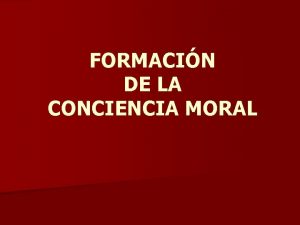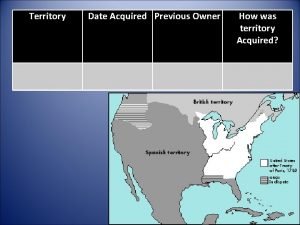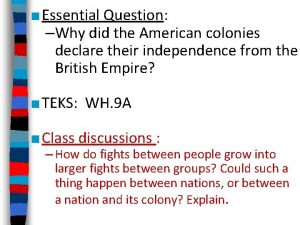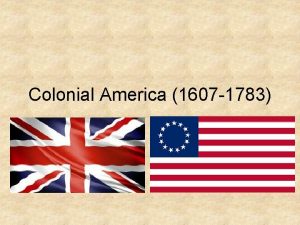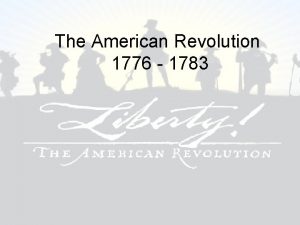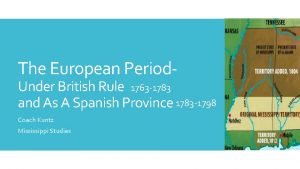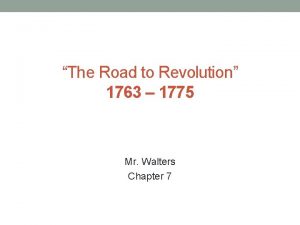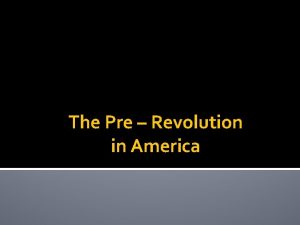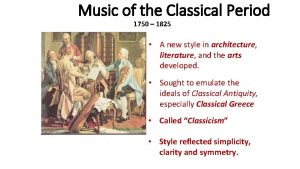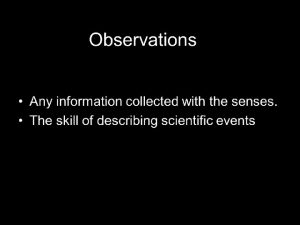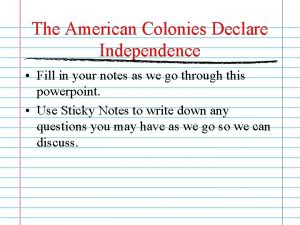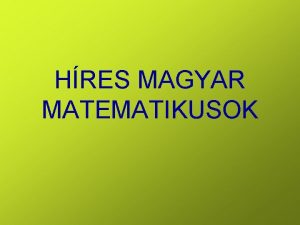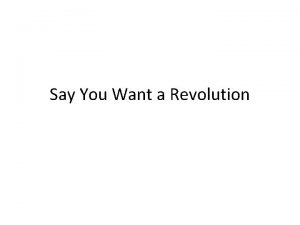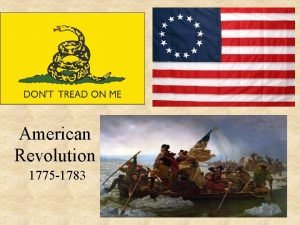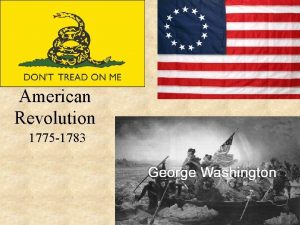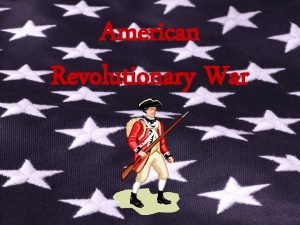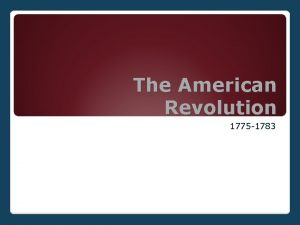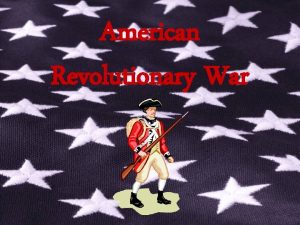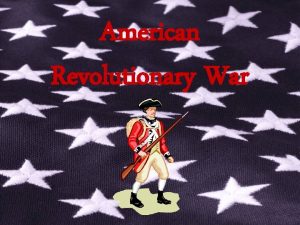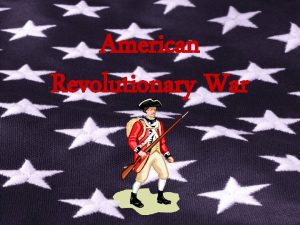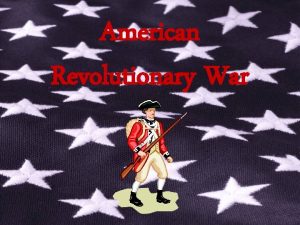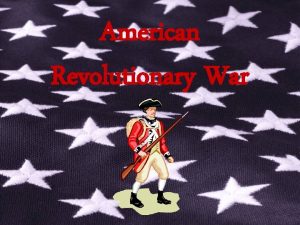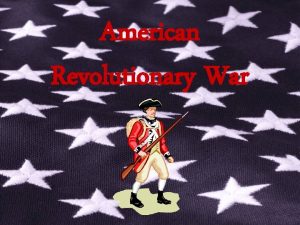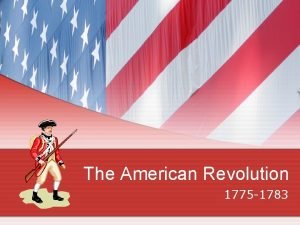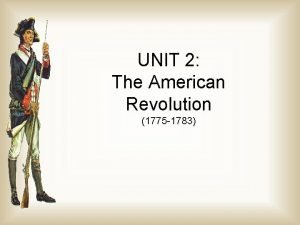American Revolution 1775 1783 13 Colonies pg 91
















- Slides: 16

American Revolution (1775 – 1783)


13 Colonies (pg. 91) • By 1775, the 13 Colonies had 2, 500, 000 people • Three Areas: – New England (settlers from England & Scotland) • Economy based on wheat farming & trade with Caribbean • Boston was the big city – Middle Colonies (Dutch, Swedes, English, Germans, Scots, Irish and many other settlers) • Breadbasket (farmers) • New York and Philadelphia were the big cities – Southern Colonies (settlers from England France, Germany) • Tobacco, sugar, rice and farms plantations. • Used slaves from Africa • Charleston and Baltimore were the big cities

Government (pg. 92) • Representative Government – Citizens elect people who represent them in government • All free adult male citizens in the 13 Colonies could get involved in the decision making process, but the British still controlled the laws of the colony • The local people could pass laws as long as they didn’t go against the wishes of the King of England. – If the King or British Government didn’t like a decision, they could veto (cancel) it

Protest • The Seven Year War was expensive for the British, so they raised taxes in the 13 Colonies to pay for the war • The British also kept an army in the 13 Colonies to keep order. More taxes were needed to pay for the army • The 13 Colonies citizens protested the taxes

Taxation Without Representation • Being taxed without having citizens elected to speak for you in government – The citizens of the 13 Colonies wanted the right to make decisions if they had to pay taxes • Many citizens felt the taxes were a waste of money, as France was no longer a threat in North America

Too Many Taxes!!! (pg. 95) • The British put many taxes on the 13 Colonies citizens. People hated these taxes! – Sugar Act (1764) – “sugar” – Stamp Act (1765) – “stamps and legal documents” – Townshend Act (1767) – “glass, tea, silk, paper, paint, lead” – Tea Act (1773) – “East Indian Company (British) was given a monopoly on all tea” • Boston Tea Party – 50 people dumped 3 ships of British tea into the sea as a protest to the tea taxes – Intolerable Acts (1774) – “Boston was closed to shipping until the tea was paid for. Soldiers sent in. Citizens not allowed to meet in groups. • Quebec Act was considered an intolerable act. Why? ? ?

Discuss with a partner: • What rules at Maple Leaf would you like to change? • Make a list of your top 3 rules

American Revolution • 1775, protests turned into a violent armed conflict known as the American Revolution • The 13 Colonies fought against the British for their freedom • The United States of America was created after the colonists defeated the British in 1783



Canada during the American Revolution • The people of Quebec and Nova Scotia did NOT turn violent in their protests, and chose to stay apart of the British Empire • The Americans tried to get the people of Quebec and Nova Scotia to join in the revolution with the 13 Colonies

American Invasion of Quebec (New Years Eve 1775) • The American revolutionaries decided to do a two-pronged attack into the colony of Quebec. • First, they attacked Montreal, and easily captured it. • They then attacked Quebec, with was a fort city. By the time the Americans got to Quebec, it was winter and their army was in bad shape from starvation (no food). They attacked but could not take the fort. – 200 American soldiers died, including General Montgomery – British only lost 6 soldiers • The British Navy arrived in May 1776, and the Americans went home.

2 -Pronged Attack

• George Washington, the leader of the American revolutionaries (and the future first President of the United States of America) urged Quebecers to join the revolution. He stated that he had sent soldiers to Quebec to protect the Canadiens, not to hurt them.

Nova Scotia • Many of the people in Nova Scotia were Americans • The people in Nova Scotia remained neutral (didn’t pick sides) during the American Revolution • Nova Scotian’s were called “Neutral Yankees”
 Did american revolution cause french revolution
Did american revolution cause french revolution Catecismo de la iglesia 1783
Catecismo de la iglesia 1783 Treaty of paris 1783 apush
Treaty of paris 1783 apush Mexican cession previous owner
Mexican cession previous owner Us in 1783
Us in 1783 Catecismo de la iglesia 1783
Catecismo de la iglesia 1783 1783-1607
1783-1607 Us in 1783
Us in 1783 Under british rule, 1763-1783
Under british rule, 1763-1783 1775-mr4
1775-mr4 Battle of lexington and concord winner
Battle of lexington and concord winner Peter zenger american revolution
Peter zenger american revolution Classical music has less complicated texture
Classical music has less complicated texture Carl wilhelm scheele forensics
Carl wilhelm scheele forensics What is the significance of july 4 1776 brainpop
What is the significance of july 4 1776 brainpop Leghíresebb matematikusok
Leghíresebb matematikusok May 1775
May 1775

